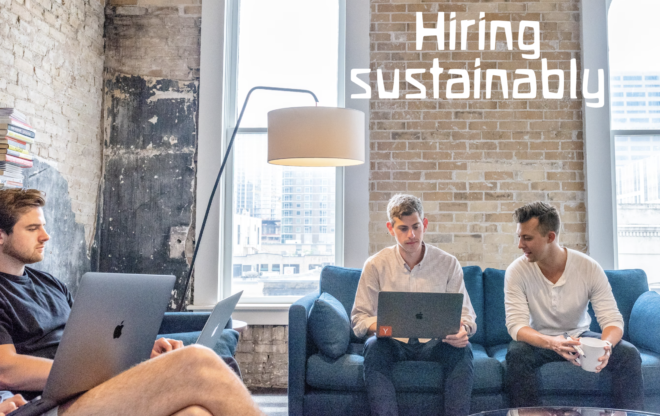Who is a better recruit? The guy who rides his bike to work to save carbon emissions or the one who flies to vegas every weekend for fun? You can determine who will fit your ESG policy before you hire.
When you hear the word “sustainability”, you’ll be more likely to think about green energy and environmental conservation than HR departments and hiring practices. However, sustainability is more than a buzzword: it’s a philosophy. Reducing waste is the central tenet of sustainability, and that goes for both carbon footprints and staff retention.
Inefficiency and waste are as bad for business as they are for the planet, and tackling these problems requires the same approach in both instances. Businesses wish to build more sustainable practices because they reduce waste, improve net profits, and help ensure commercial success. After all, a company is defined by its workforce, and pushing sustainability through recruitment practices can bring clear benefits to every level of a business.
What is Sustainability?
Once a business reaches a certain size, sustainability can become as important as growth. When a company begins to turn a consistent profit, stakeholders need to begin reassessing business processes to look at the parts of the firm that aren’t running as efficiently as they might be. In some cases, finding ways to pare down operating costs could be just as vital as incoming revenue in maintaining net profits.
While wasteful business practices exist, companies may as well be flushing their earnings down the drain. Furthermore, corporate inefficiency on a grand scale is something that the modern consumer is likely to take a very dim view on, resulting in sometimes irreparable damage to the brand.
On the other hand, a focus on stability could head off these problems before they even come to pass. Areas where sustainability is likely to prove a priority include material requirements, energy usage, productivity, and, especially, recruitment.
It’s almost impossible to disentangle commercial sustainability from environmentalism because it’s very rare to find one without the other: a firm that’s cut down on industrial waste and bloated business processes will, by design or otherwise, probably be generating a smaller carbon footprint.
Business Sustainability 101
There’s nothing stopping stakeholders and department heads from getting together to look at the ways a business can reduce waste and improve efficiency. However, a genuine commitment to sustainable business practices is an intensive process that requires a dedicated team. Sustainability departments usually employ a three-tier structure:
- Chief sustainability officer: The chief sustainability officer (or head of sustainability) represents sustainability at a board level and will decide with other executives and stakeholders about the direction of a company’s sustainability policy.
- Sustainability team members: This will usually be a small team comprised of a few members who report to the chief sustainability officer and help execute and administrate sustainability policy.
- Sustainability Embeds: These will be staff integrated across the company’s business structure. They don’t report directly to the chief sustainability officer, but they do interface with the sustainability department to ensure sustainable practices are being followed across the company.
Sustainable Recruitment
Poor hiring practices can take a lot out of a company, both in terms of costs and efficiency. Hiring, onboarding, and training a single candidate costs the average company thousands in front-end investment, and if that hire is unsuitable or unmotivated, they can slow down a department and negatively impact the work rate of more competent staff.
Sustainable recruitment, therefore, is a drive to create productive long-term employee relationships that can prove mutually beneficial. Leveraging candidate data with the right online resources is the best way to find new prospects who tick all the boxes for a position and can bring a proven track record to the role.
Sustainable Employment Roles
Sustainability recruitment networks aim to give employers access to a wide talent pool of accomplished and motivated staff who can help enact sustainability practices and best advise a business where policy can be improved. Of course, the kinds of sustainability positions your company can benefit from will depend greatly on your industry. Some positions might include:
- Air quality analyst
- Emission trading manager
- Climate Change Consultant
- Energy director
- Renewable energy specialist
- GHG policy analyst
These are just a small sample of the different sustainability positions many companies will hire for. Sustainability recruitment networks and agencies can identify the positions most likely to bring about positive change for your company.
Sustainable Employee Retention
Sustainable recruitment puts the emphasis on finding the recruit most suited for a long-term future in a role. They will intermittently check back in a few months’ time to see how the new hire is getting on in their role. Sustainability recruiters aren’t just there to find a fit for a job; their role is also to educate firms about how to get the most out of their sustainability hires. In this way, both employees and employers have a mutual obligation to each other to help both parties further the goal of stability within the business.
To this end, it’s critical that new hires possess values that align with the brand values of the company they’re moving to, or they are likely to have trouble excelling in the position. Fortunately, there’s an easy way to avoid this: integrate sustainability into the way you market your brand during the hiring process.
Members of the modern workforce are more environmentally conscious than their forebearers, and the best and brightest will want to be able to go home and sleep at night knowing that the company they work for is one of the good guys. Sustainability can boost employee engagement, but it can also attract talented candidates who are onboard with your company’s values before they’ve even walked through the door on their first day on the job.
Elsewhere, you can look at the micro-processes within your company that can make sustainability happen. Converting your application processes to paperless systems is one obvious way you can save money and make your intentions known to prospective candidates. As more business processes move to digital, this is a small but important step in enacting greener business processes.
Final Thoughts
Sustainability needs to be more than just lip service to corporate respectability politics: it needs to be an influence on the orientation of your entire business, and recruitment is the best place to begin your journey to true sustainability. Hiring a sustainability department can set your company on the path to more efficient and environmentally friendly business practices which could also help save money and drive profits.




